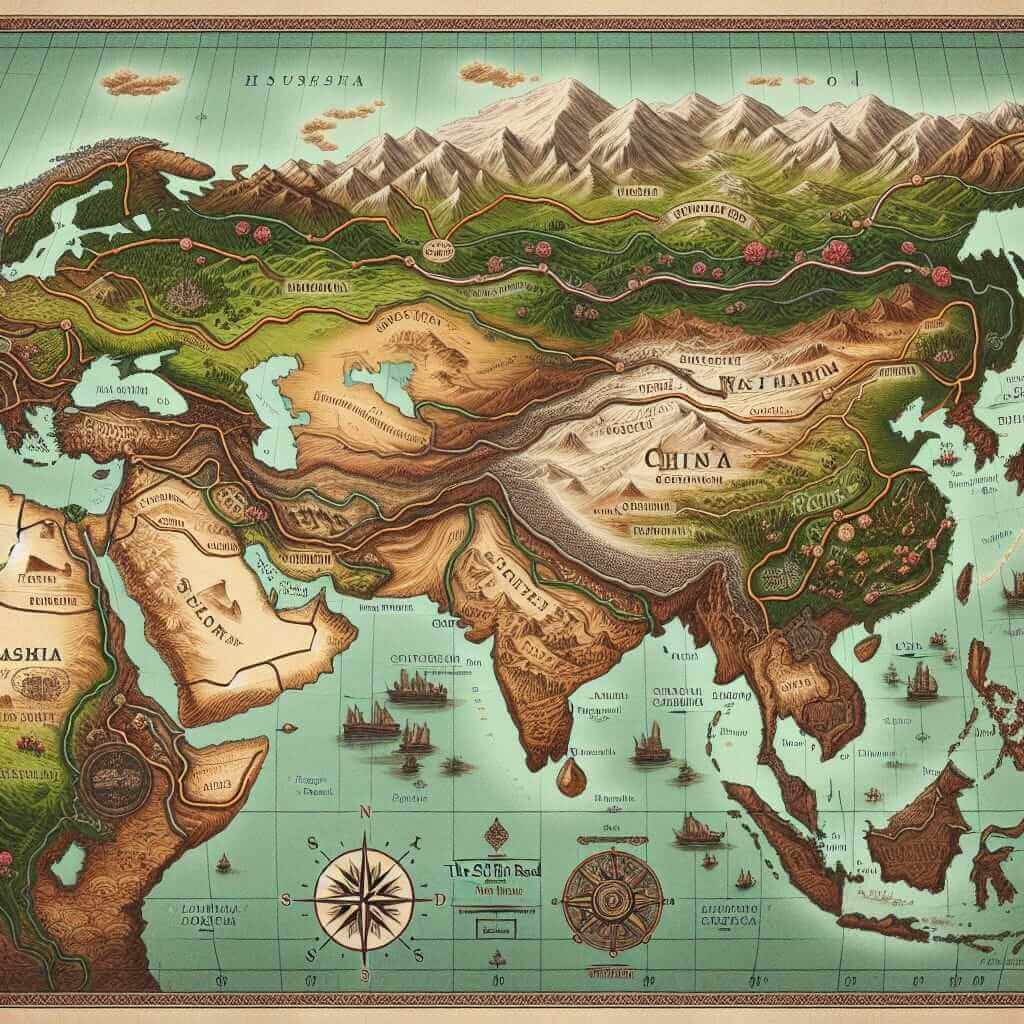The IELTS Reading section challenges candidates to comprehend and interpret detailed texts on a variety of topics. One recurring theme in past IELTS exams is the impact of trade on cultural exchange. This topic is not only timely but also rich in content, making it a probable subject in future tests. According to our analysis, subjects relating to trade and culture have appeared frequently, reflecting the global interconnectedness that influences life today.
In this article, we provide a detailed IELTS Reading practice test on “Cultural Exchange Through International Trade,” formatted to match the IELTS Reading section. The practice includes questions and answer keys, dedicated vocabulary, grammar notes, and tips to help improve your Reading score.
Cultural Exchange Through International Trade: Reading Practice
Passage
Cultural Exchange Through International Trade
The phenomenon of cultural exchange through international trade dates back centuries, exemplified by historic routes such as the Silk Road. These trade routes facilitated the flow of goods, ideas, and cultures between distant civilizations, profoundly impacting societies across continents. The exchange was not one-sided; Asian spices found their way into European kitchens, while Western fashion styles influenced Eastern textiles.

In contemporary times, globalization has intensified cultural exchanges, making them more ubiquitous and complex. The export and import of cultural commodities, such as films, music, fashion, and food, have created a global cultural marketplace. Take, for instance, the widespread popularity of sushi, a Japanese staple, which is now available in many countries around the world. Similarly, Hollywood movies have a significant presence in many non-Western countries, promoting Western lifestyles and values.
However, international trade does not always lead to a balanced cultural exchange. Critics argue that globalization has promoted a form of cultural imperialism, where dominant cultures overshadow local traditions. Rapid cultural assimilation can dilute indigenous practices, leading to a loss of cultural identity.
Economic power plays a significant role in cultural influence. Countries with robust economies often have the resources to spread their culture abroad effectively. For example, the United States, being one of the largest economies, has successfully exported its culture globally. Conversely, smaller economies may struggle to have their cultural voices heard on the international stage.
Despite the challenges, international trade also offers opportunities for preserving and celebrating cultural diversity. By exporting unique cultural products, smaller nations can share their heritage with the world, fostering mutual respect and understanding. For instance, India’s Bollywood industry has not only survived but thrived internationally, showcasing Indian culture and values through its films.
In conclusion, while international trade can sometimes threaten cultural uniqueness, it also has the potential to enhance global cultural richness. The key lies in promoting a balanced exchange that respects and preserves the integrity of diverse cultures.
Questions
1. Multiple Choice
-
Which historic trade route is mentioned in the passage?
- a) Spice Route
- b) Silk Road
- c) Tea Route
- d) Coffee Route
-
According to the passage, which country’s cultural products have a significant global presence?
- a) Japan
- b) India
- c) United States
- d) China
2. Identifying Information (True/False/Not Given)
-
The Silk Road facilitated the exchange of ideas and cultures between distant civilizations.
- True
- False
- Not Given
-
Globalization has made cultural exchanges more difficult.
- True
- False
- Not Given
3. Matching Information
Match the following types of cultural products with their examples mentioned in the passage:
- Japanese staple
- Western cultural products
- Indian film industry
a) Sushi
b) Hollywood movies
c) Bollywood
4. Summary Completion
Complete the summary using the words from the box below.
The phenomenon of cultural exchange through __ dates back centuries. Historic trade routes like the Silk Road allowed for the exchange of __ and ideas. In modern times, globalization has intensified these exchanges, allowing cultural __ to reach global audiences. However, critics argue that this has led to cultural __, threatening local traditions.
Words:
- Imperialism
- Commodities
- International trade
- Products
Answer Keys
1. Multiple Choice
- b) Silk Road
- c) United States
2. Identifying Information (True/False/Not Given)
3. True
4. False
3. Matching Information
5. a) Sushi
6. b) Hollywood movies
7. c) Bollywood
4. Summary Completion
The phenomenon of cultural exchange through international trade dates back centuries. Historic trade routes like the Silk Road allowed for the exchange of products and ideas. In modern times, globalization has intensified these exchanges, allowing cultural commodities to reach global audiences. However, critics argue that this has led to cultural imperialism, threatening local traditions.
Lessons Learned
Common Mistakes
- Misinterpreting Keywords: Ensure to look out for synonymous expressions that often are used to paraphrase common terms from the questions.
- Speed Reading: Often, candidates rush through passages and miss critical details. Practice reading for both speed and comprehension.
Vocabulary
- Cultural Imperialism (n.) ˈkəl-chər-əl im-ˌpir-ē-ə-ˈliz-əm: The domination of one culture over another.
- Assimilation (n.) ə-ˈsi-mə-ˌlā-shən: The process of integrating new ideas into an existing cognitive structure.
- Preserve (v.) pri-ˈzərv: To keep something in its original state or in good condition.
Grammar Point
Pay attention to the use of passive voice in academic texts. For example, “The Silk Road facilitated the flow of goods,” can be transformed into “The flow of goods was facilitated by the Silk Road.” Both are correct but may alter the emphasis.
Conclusion
Excelling in the IELTS Reading section takes careful preparation and regular practice. Use this passage and accompanying exercises to refine your skills. Be sure to explore our related articles, such as those on the cultural impacts of globalization on local traditions and the influence of cultural exchange on social understanding, which can further enhance your understanding of cultural topics. Good luck!